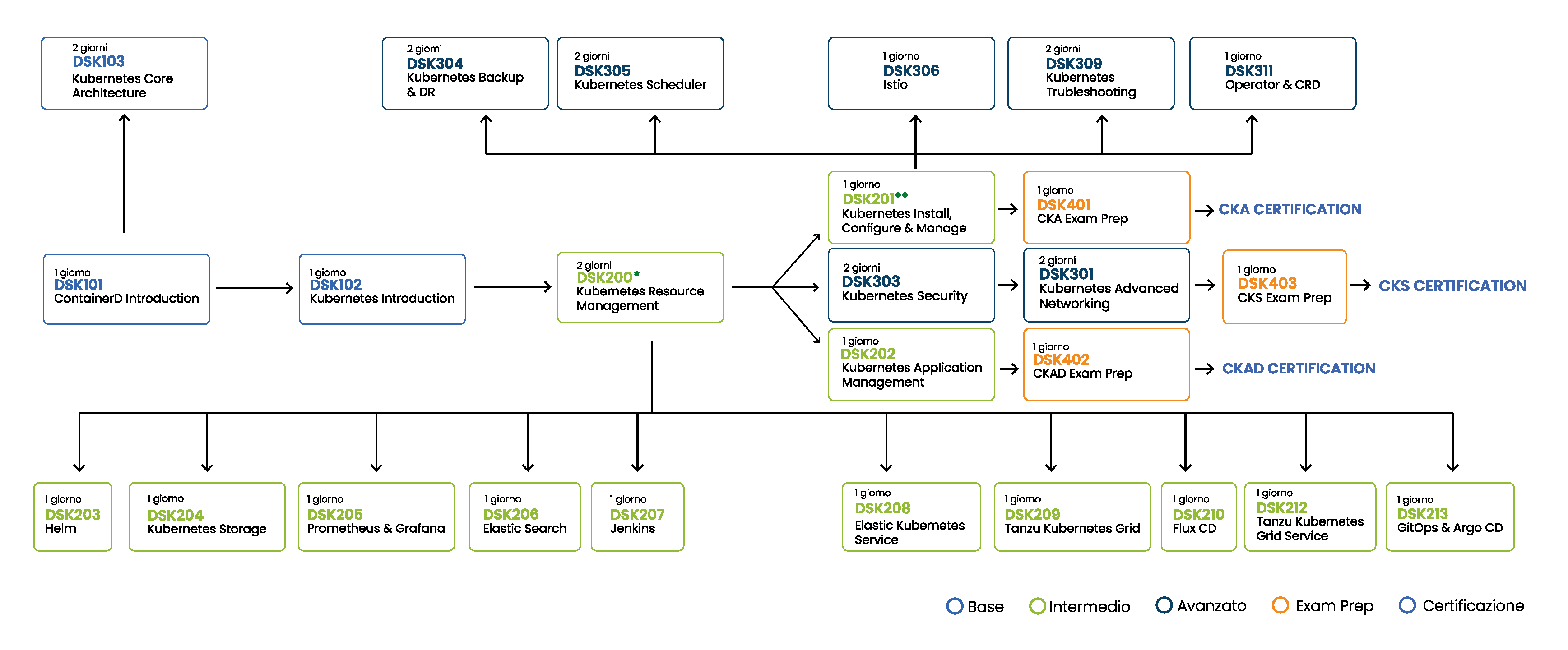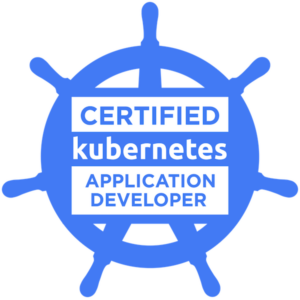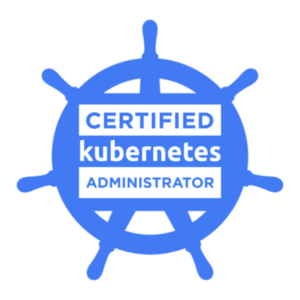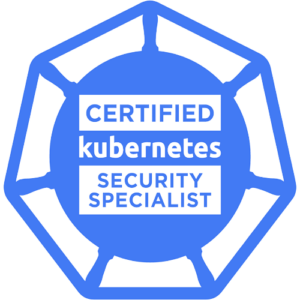
Kubernetes
Kubernetes is essential for the management and orchestration of IT applications.
It simplifies deployment and scalability of containerized applications, offers advanced features for redundancy and scalability, and is highly portable across different infrastructures. Learning Kubernetes and participating in training courses enables improved skills and career opportunities in the industry. With experience gained on various consulting training projects, we have designed a training path that can take students through DSK courses to discover Kubernetes.

Our experience with Desotech Srl, in the field of IT training, has been overwhelmingly positive. Their teaching methodology, deeply rooted in experiential learning, has greatly enriched our training courses, making each session not only informative but also extremely applicable to our daily needs. The expertise and preparation of Desotech's instructors are unquestionably top-notch, ensuring that each course not only conveys the fundamentals but also pushes participants to explore and deeply understand the potential of Kubernetes.

A comprehensive course with instructional examples useful for understanding the operation of Kube components. Also very useful descriptions of real scenarios in the operating environment. Knowledgeable and helpful lecturers.
I have participated in several courses taught by Desotech and I am very pleased with their professionalism. The way the labs are used is great to use remotely. Overall, I am satisfied. Thank you.
Excellent course where we covered several topics and devoted the right amount of time to exercises. The lecturers were clear in their exposition and patient in their explanations to various questions.
The course met my expectations, providing the resources and information needed to prepare for the exam.
Excellent course, focused on the questions that will be asked in the certification. Very knowledgeable lecturer
Knowledgeable lecturer. The topics covered were interesting and useful for daily work activities.
Very knowledgeable lecturer and course content well presented and explained. Useful exercises done as well.
Very knowledgeable lecturer. Good choice of having students operate on systems directly to better memorize concepts.
Very interesting course. Lecturer Francesco Grimaldi was very clear in his exposition and was very knowledgeable.
The course was very interesting and covered all the topics on the syllabus. The lecturer expressed the concepts clearly and comprehensively, encouraging interaction with the class.
The course has the advantage of being very practical and thus allows you to be able to immediately experience the different concepts that are introduced by the lecturer. It certainly allowed me to shed light and understand many aspects that in everyday life instead are “ignored” due to the use of higher level tools (e.g., OKD graphics client). The lecturer was always very helpful, comprehensive and knowledgeable in answering questions.
It was a good course useful to start using this new technology or to start preparing for certification. I feel that the lecturers are well prepared. The lectures are clear, as are the examples provided. Appreciable that a Cloud space is provided where the exercises can be done.
Course taught in an excellent manner, although there were a myriad of fundamental concepts the course lecturers were able to succeed in providing a sorting and expressing them in a usable and consistent manner. The technical level held during the course was excellent, and there was a willingness on the part of the lecturers to answer questions and cover course-related but off-topic topics as much as possible.
Kubernetes
Catalogo
Scopri i dettagli di ogni corso Kubernetes DSK consultando i contenuti di ogni scheda o
seleziona un Bundle di corsi Kubernetes a tua scelta, in base alle tue necessità didattiche.
Containerd Introduction
-Familiarity with the Linux operating system
-Proficiency in the operating system command line
Kubernetes Introduction
-Basic knowledge of Linux CLI
-Knowledge of basic concepts of containerization and how containers work.
Kubernetes Core Architecture
-Basic knowledge of Linux operating system and command line concepts
-Understanding of the basics of virtualization and containerization
Kubernetes Resource Management
-Completion of DSK101 and DSK102 courses or equivalent knowledge
-Basic knowledge of Kubernetes and container orchestration.
Kubernetes Install, Configure and Manage
-Completion of DSK101 and DSK102 courses or equivalent knowledge
-Basic knowledge of Linux
Kubernetes Application Management
-Familiarity with basic Kubernetes concepts
-Experience with the command line
Helm
-Good knowledge of Kubernetes
-Good knowledge of YAML/JSON
Kubernetes Storage
-Good knowledge of Kubernetes
-Good knowledge of YAML/JSON
Prometheus and Grafana
-Good knowledge of YAML/JSON
-Knowledge of monitoring systems
ELK
-Good knowledge of YAML/JSON
-Knowledge of at least 1 programming language
Jenkins
-Fair knowledge of software development
-Basic knowledge of docker and kubernetes
Elastic Kubernetes Service
-Basic knowledge of AWS public cloud
-Basic knowledge of text editor on terminal
Kubernetes for vSphere
-Basic knowledge of Kubernetes
-Basic knowledge of vSphere
FluxCD
-Basic knowledge of Kubernetes
-Basic knowledge of Git
Kubernetes Install and Configuration
-Concepts of containerization and container orchestration
-Principles of TCP/IP networking and the HTTP protocol.
Kubernetes Advanced Networking
-Experience configuring Kubernetes
-Networking knowledge
Kubernetes Security
-Familiarity with cybersecurity
-Experience with systems and network administration
Kubernetes Scheduler
-Basic knowledge of TCP/IP stack
-Basic knowledge of text editor on terminal
Istio
-Basic knowledge of the YAML language
-Familiarity with microservices architectures
Kubernetes Troubleshooting
-Basic knowledge of linux operating system
-Basic knowledge of TCP/IP stack
CKA Exam Prep
-Completion of CKA learning path
CKAD Exam Prep
-Completion of CKAD learning path
CKS Exam Prep
-Completion of CKS learning path
CKA, CKAD & CKS
Learning Paths

Certified Kubernetes Application Developer
The Certified Kubernetes Application Developer (CKAD) certification is among the most recognized credentials for Kubernetes application developers. It is a certification offered by the Linux Foundation, in collaboration with the Cloud-Native Computing Foundation (CNCF). The training path toward the DSK402 (CKAD Exam Prep) course focuses on the skills needed to build, configure and manage cloud-native applications on a Kubernetes cluster.
The CKAD exam is designed to assess a developer’s practical knowledge in using Kubernetes. It includes a series of exercises that require developers to demonstrate their ability to configure networking, create and manage service accounts, and implement best practices for applications on Kubernetes Passing the CKAD exam demonstrates a thorough understanding of Kubernetes application development skills.
Course path objectives include creating and configuring services, managing pods and deployments, using service accounts to control access to resources, using the command line to interact with Kubernetes, and understanding best practices for cloud-native application development.

Certified Kubernetes Administrator
Certified Kubernetes Administrator (CKA) certification is critical for system administrators and DevOps engineers dedicated to managing and administering Kubernetes clusters. The training path to DSK401 (CKA Exam Prep) focuses on the skills needed to effectively configure and manage a Kubernetes environment in production.
The CKA exam includes a series of hands-on exercises that test an administrator’s skills in network management, configuring security policies, scaling and monitoring clusters, and troubleshooting common problems. Passing the CKA exam demonstrates a solid understanding of critical operations and best practices for managing Kubernetes clusters.
Certified Kubernetes Administrators are able to create and manage robust, reliable and scalable Kubernetes environments, deploy storage solutions, configure access and authentication policies, monitor cluster performance and troubleshoot operational issues. CKA certification provides evidence of the skills and having gained the experience needed to successfully manage Kubernetes infrastructures in production.

Certified Kubernetes Security Specialist
The Certified Kubernetes Security Specialist (CKS) certification is an essential step for security professionals, system administrators, and DevOps professionals who want to protect Kubernetes clusters. The training preceding the DSK403 course (CKS Exam Prep) focuses on the essential skills needed to successfully protect and consolidate a Kubernetes environment in production.
The CKS exam includes a series of hands-on activities designed to test practitioners’ skills in designing and enforcing security policies, implementing best practices for protecting workloads, managing identities and access, and resolving common security issues. Passing the CKS exam demonstrates a thorough understanding of critical security strategies and recommended practices for securely managing Kubernetes clusters.
Certified Kubernetes Security Specialists are able to implement advanced security policies, protect sensitive workloads, effectively manage identities and access, and resolve security threats. CKS certification demonstrates the skills and experience needed to successfully protect Kubernetes infrastructure in a production environment.











